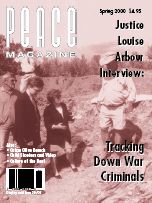
Peace Magazine Spring 2000, page 29. Some rights reserved.
Search for other articles by Barrie Zwicker here
Rose A. Dyson. Black Rose Books, $19.99. Isbn 1-55164-152-6
List the issues most deserving of a multi-disciplinary critique because of their complexity and violence in the media will surely be near the top.
Take violence by itself. Readers of this magazine need no reminding that the roots of violence are as long and tangled as the eruption of violence itself can be short and brutally simple.
Take the media separately. They comprise an increasing network of production centers and outlets, and other sophisticated hardware and software along with an increasingly integrated corps of human beings. Together they manufacture a synthetic reality that reaches around the world and into our psyches.
Anyone who would tackle the whole of the phenomenon is a brave soul indeed. And Rose Dyson is such a soul.
I can think of four groups who have a more immediate interest, in this issue than the average citizen: academics who study it; media people, from corporate shareholders to specialized technicians who finance, produce and distribute violent media; educators, especially media literacy educators; and activists in the fields of peace, civil liberties and media. There's plenty of room for disagreement within each group because their interests, while they partly overlap, are at significant odds.
In assessing Mind Abuse, I asked, how comprehensive is it? And how much could a person from any of the four groups learn from the author? The answers are "quite," and "a great deal."
Possibly the toughest site of negotiated meaning on this issue is within education. Most media literacy educators I know admire Dyson, but they fault her for taking what they believe is a simplistic and censorious approach. Howard Stern? Ban him from Canadian airwaves, Dyson says. Wrong, say the educators. They're face-to-face with kids who like Stern, who are subject to, and exercise varying degrees and kinds of violence. And educators insist media violence is just one factor contributing to real life violence. They cite family role models, economic conditions, and faith traditions. All of these, they say, encourage or suppress violent tendencies.
In Mind Abuse, Dyson agrees with her detractors on this point. But she takes the educators to task, and rightly in my opinion, for evasions, and accuses some of "intellectual dishonesty." She faults them for failing to identify the greed and self-exculpation inherent in the capitalist system's domination of the media, and its deliberate exploitation of minds, bodies and souls. Most educators I know are afraid to tackle this. They need Dyson's analysis as a tonic to restore their backbone. She explodes the fiction that if kids are taught how the media work, it will help solve the violence problem, noting the perpetrators of the Columbine massacre were accomplished at video games and web site production. She also demolishes the argument - perpetually trotted out by producers of media violence - that the ultimate responsibility for media content rests with individuals.
This book has its flaws. It could be better organized. For instance, the first and last chapter deal with education, yet both chapters contain significant comments unrelated to education, while relevant comments are scattered throughout other chapters. And, readability suffers somewhat by too many unduly long sentences.
However, Dyson successfully blends her 15 years of scholarship, her passion as an activist in the field, and her grasp of the larger socio-economic canvas. She provides relevant background, astute analysis, and thoughtful recommendations. Mind Abuse will enrich anyone wanting to reduce violence in society through better understanding, and curtailing violence in the media.
Reviewed by Barrie Zwicker, media critic for Vision TV.

Peace Magazine Spring 2000, page 29. Some rights reserved.
Search for other articles by Barrie Zwicker here